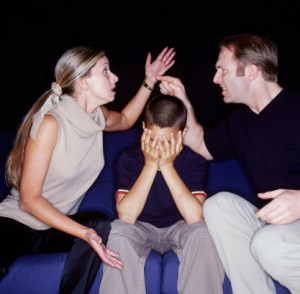Communication Gap Between Parents And Teenagers
“You have no idea what I’m going through!”
“How could you possibly understand?”
“Just leave me alone!”
Does the above seem a ll too familiar? Then you have teenagers in the house. Most parents have heard their teenager use one of these sayings at some point. A communication problem is one of the most common reasons parents give for experiencing difficulties with their teenagers. While it can be frustrating for both parties, there are steps that you can take to help bring about a solution to what is a difficult time for both parties.
ll too familiar? Then you have teenagers in the house. Most parents have heard their teenager use one of these sayings at some point. A communication problem is one of the most common reasons parents give for experiencing difficulties with their teenagers. While it can be frustrating for both parties, there are steps that you can take to help bring about a solution to what is a difficult time for both parties.
· Talk to them as an equal: If there is one single thing teenagers don’t respond well to it is being talked down to. If they think you are patronizing them, they will come out firing. Even if you aren’t, they will assume you are if your tone isn’t just right. The tone and manner in which you address them can make all the difference.
· Ask for their opinions: Asking them questions that have yes or no answers can be counterproductive. It’s far better to engage them in conversation so that they feel that they are contributing something useful. If they think you’re interested in their perspective and that they have a voice, they are far more likely to want to engage with you. If it feels like an interrogation then the defenses will go up and an argument is much more likely.
· Use I words: Rather than telling them their behavior is wrong or saying “you should do this” try saying “I feel” and then asking them if they agree. If their answer is no ask why. They need to know that they you’re interested in their opinion and that it’s a discussion and not a lecture.
· Put yourself in their shoes: We were all teenagers once so try remembering the difficulties you have gone through and there is a far better chance that you will be able to empathize with them and be more understating.
· Don’t automatically punish them: Encourage them to talk to you if there’s a problem, or if they’ve done something wrong. We all make mistakes, however, if they feel that you will just react negatively if they err in some capacity, they won’t come to you. If they know that you will help, guide and be understanding they will be far more likely to approach you in their hour of need.

Everything above is about both building a relationship with your teens and gaining their trust. Kids will react badly when they feel you are talking down to them, or show no interest in their opinion. If you approach them as equals and tell them that you will discuss and listen to them before forming an opinion, it will have positive results all round. By placing yourself in their shoes, you will start to understand them better and they will often start confiding in you more.
Teenagers are going to make mistakes whether they talk to you about them or not. If you can get them to communicate better you can at least guide them better and discuss those mistakes so that they do not continue to make them.
It’s also vital to remember that 99.9% of families go through the same problems and most get through them just fine with the kids turning into adults they can be proud of. It won’t be long before you can communicate just fine, and laugh about the problems that seem a distant memory.

